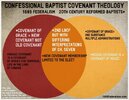Matthew1344
Puritan Board Sophomore

I got this diagram off 1689federalist.com
I am on the 20th century reformed baptist side. I did not know that before i saw this diagram. I thought a 1689er was a 20 century reformed baptist guy. On the website, one man says something along the lines of...
"20th century reformed baptist guys differ than paedo guys in the sacraments, but learn their covenant theology from them. But, the 20th C.R.B. have to see that those two systems do not fit. You can't have a Presbyterian covenant theology and not their way of sacraments. Their sacraments are different because they see the covenants different. And our sacrament is the way it is because it makes since of the way we see the covenant. To like their way of covenants and not their sacraments is inconsistent. And vice verse, to like baptist sacrament but not out way of seeing the covenants is incosisntant."
Not i used more words than him, but this is what he was getting at. This was pretty shocking to me. I never heard this before. But he was right. i did learn my cov theology from edwards and hodge. So i decided i needed to go further in my understanding of my understanding of the covenants and the sacraments, and this time i wanted to look at baptist guys, but i knew of zero(my own fault). Just spurgeon, but i don't think he is the best exegete ha. love his gospel illustrations and his way of making simple the difficult, but many times i just see the text to be way off his point. Not all the time, but more than enough to go to him to learn how to connect the covenants. So besides him, i didn't know of anyone. In the videos, i heard them reference coxe, and pascal. I will be buying those guys books tomorrow. But after that i do not know of anyone to look at.
Currently i am stuck in two worlds.
-I like augustine "The old is what is in the new concealed, and the New is whats in the old revealed." It only makes sense to me that the covs build on top of each other. Same in substance. Each covenant revealing more and more of Gen 3:15.
-I think the baptist understanding of the administration of baptism lines up with the NT the best. I have heard many debates of white and others, and i think his exegesis is better.
So, i am stuck between two worlds i guess.
2 sets of questions...
1) What do baptist mean only the NC is the COG? IF that is true the what are all the old covenants? Are the all C.O.W.? And if so what does that mean?
2) "C.O.G.= One Substance under multiple Administrations" is only under the 20th century baptists. Do 1689 guys not believe this? If not then what other substance than the seed (Christ) crushing the serpent(satan) is there?
